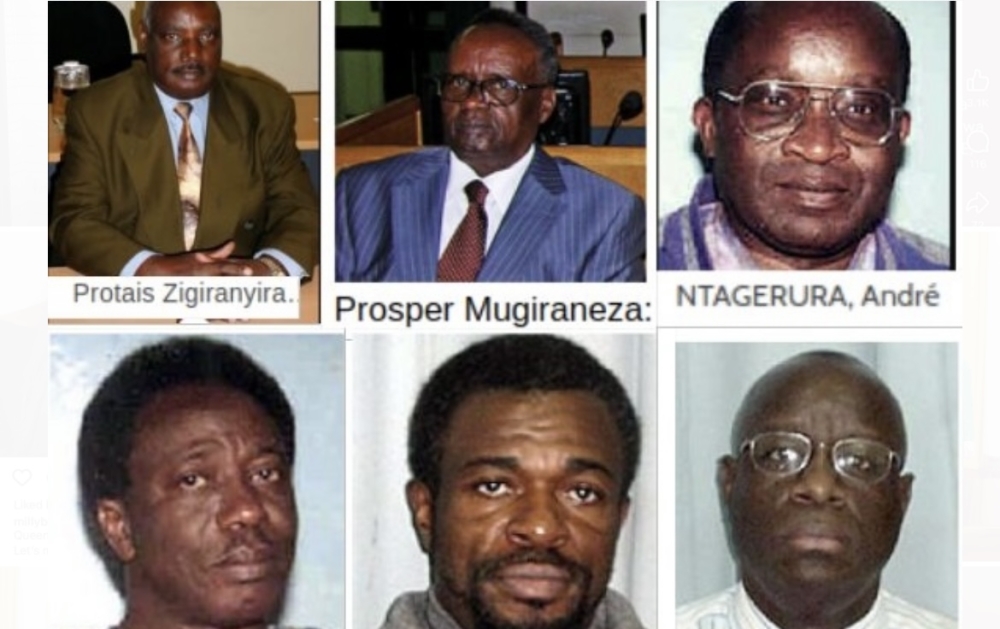

Rwandan experts and activists against genocide have reacted to the move by DR Congo to host six convicts of the 1994 Genocide against the Tutsi who have for years been in Niger after serving their sentences.
The group includes masterminds of the Genocide against the Tutsi, who were released by the now-defunct International Tribunal for Rwanda (ICTR), either after serving their sentences, or after they were acquitted, mostly on technicalities.
The six men are Innocent Sagahutu, Francois Xavier Nzuwonemeye, Prosper Mugiraneza, Alphonse Nteziryayo, Andre Ntagerura, Protais Zigiranyirazo.
Owing to their role in the Genocide, which claimed over one million lives, the convicts remained stuck with the UN court in Tanzania – some going for decades – as different countries including those hosting their families refused to receive them.
ALSO READ: Niger expels Genocide convicts transferred by UN Court
In 2021, they were controversially transferred to Niger, which expelled them weeks later. But they have since remained stuck there.
Zigiranyirazo, infamously called Mr Z, was a core member of the Akazu, the elitist group that was at the core of planning the Genocide. In 2008, he was convicted of crimes of genocide, but was acquitted on appeal in 2009.
On the other hand, Nzuwonemeye and Sagahutu were, respectively, the commander and deputy commander of the Reconnaissance Battalion in the former Forces armées rwandaises (FAR).
Nzuwonemeye was charged with conspiracy to commit genocide, complicity in genocide, crimes against humanity, and violations of the Geneva Convention. He was acquitted in 2014.
Sagahutu was convicted of ordering the killing of former Rwandan Prime Minister Agathe Uwilingiyimana and the murder of 10 Belgian UN peacekeepers in Kigali, Rwanda, in April 1994.
He was sentenced to 20 years in jail, but the Appeals Chamber reduced it to 15 years, and he was released before he completed his sentence on the orders of the former UN court president, Theodor Meron.
For Nteziryayo, who was the prefect of Butare, he was charged with crimes of genocide. He was sentenced to 30 years in prison and after an appeal, the sentence was reduced to 25 years. He was later granted an early release in 2016.
Ntagerura, who was the minister of Transport and Communications in 1994, was charged with crimes of genocide and was acquitted on appeal in 2004 after the court said the prosecutors had not proved the case beyond reasonable doubt.
ALSO READ: Three Genocide fugitives located in the Netherlands
Some of these men have been linked to the genocidal force, the Democratic Forces for the Liberation of Rwanda (FDLR), which operates in eastern DR Congo. The UN-sanctioned FDLR was founded by remnants of the perpetrators of the Genocide against the Tutsi.
The Congolese presidency has denied that the President Felix Tshisekedi’s Director of Cabinet Anthony Nkinzo wrote a July 26, 2024 letter confirming that DR Congo had offered to host the Genocide convicts "as soon as possible.” Tshisekedi’s office has reportedly described the now-leaked letter as "fake news.”
However, a note verbale by the residual mechanism of the former UN court (UNIRMCT) has proved the letter is authentic.
The note verbale dated September 6, 2024 sent by the UNIRMCT to the Nigerien foreign ministry did prove that indeed President Tshisekedi had requested that the men be relocated to his country.
Activists against the genocide who talked to The New Times called out the move, saying it speaks to DR Congo’s actions over the past few years, which is siding with genocidal forces.
"Don’t you see that this is negative solidarity with the genocidaires?” Yolande Mukagasana, a survivor of the Genocide against the Tutsi and an activist posed.
She argued that welcoming the six men to DR Congo adds salt to injury for Genocide survivors because they would be given free rein to join their peers to continue pushing for the genocidal agenda.
University lecturer and political analyst Ismael Buchanan told The New Times that the move sheds light on the existing solidarity between the Congolese government and the FDLR.
"It means that this terrorist group will continue to be in a position of spreading their genocide ideology freely across [DR Congo] and the entire region. They will continue to kill innocent people like the FDLR has been doing over the past 30 years,” Buchanan said.
Rwanda had for years expressed willingness to repatriate the men in question to ensure they are reintegrated into society like ex-convicts from other jurisdictions but they have not shown willingness to come.
ALSO READ: Reintegration of ex-genocide convicts: a journey of healing, reconciliation
Boubacar Tambadou, the UNIRMCT registrar, in a 2023 interview with The New Times, noted that the Rwandan government had consistently stated its willingness to accept them back home because they are Rwandan nationals.
"On the other hand,” Tambadou said, "the United Nations has an obligation not to force people to go to a country against their will, and so far, these eight men in Niger have expressed very unequivocally that they do not want to return to Rwanda.”
He added that the UN could not force them, unfortunately.
"It would be against international law to compel someone to go to a country that they do not wish to go back to. Having said that, the Security Council has consistently stated in no less than eight resolutions, encouraging the member states to accept the released and acquitted persons on their territories,” he said.


